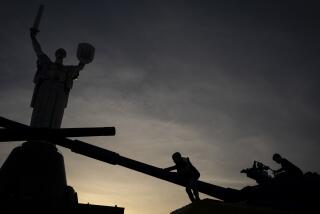Uzbekistan deserves better
Not long after I spoke out against a massacre of mostly peaceful protesters in Uzbekistan in 2005, I was arrested by government security services and taken away. I was drugged, beaten, falsely accused of directing the uprising, charged with financial crimes and sentenced to 14 1/2 years in prison. There I was put to work in a brick factory, and my health deteriorated.
During the brutally cold January of 2008, as a punishment for political prisoners, three other inmates and I were put for five freezing days in the “monkey cage” — an unheated, open-air cell — wearing only T-shirts and pants. We survived by lying back to back and moving continuously. Afterward, I was near death.
In late 2008, when my wife, Indira, was allowed to see me for the first time in three years, I was frail and incoherent, my body scarred from continuous torture. I was so weak I could barely recognize her.
Finally, efforts by human rights groups and diplomats made Uzbek authorities realize that I was more trouble to them dead than alive. I was freed in late 2009 and received asylum in the United States, where I now live. I was lucky, but thousands of other prisoners are tortured and abused by Uzbek police and prison guards. Millions more in my country lack even the most basic rights and live in constant fear of their government.
These days, though, if Uzbekistan is in the news, it is as a side note to the discussion about withdrawing U.S. troops from Afghanistan in 2014. Policymakers speak of its strategic importance to the United States. Indeed, the so-called northern distribution network — a transit corridor that runs through Uzbekistan — is the route used to move more than 50% of the supplies from Central Asian ports to Afghanistan for the NATO troops.
As the 2014 troop withdrawal approaches, the Obama administration is focused on securing the agreement of Islam Karimov, my country’s authoritarian president, to allow thousands of military vehicles, containers and other equipment to move out through Uzbek territory. In Uzbekistan, where no political opposition or dissent of any kind is tolerated and the president has ruled for more than 22 years with an iron fist, only Karimov’s approval is needed.
In January, in an effort to move closer to such an agreement, the Obama administration successfully lobbied Congress to waive prohibitions on the sale of military equipment to Karimov’s government, a ban put in place in 2004 to respond to Uzbekistan’s atrocious human rights record.
U.S. officials have at times publicly called the Uzbek government to account over its abuses. But Karimov is getting mixed messages. I know my government: Lifting human rights restrictions at a time when activists and independent journalists are in jail, media are censored, civil society organizations are kept from operating and forced child labor is used on a massive scale is not the way to convince Karimov you’re serious about human rights.
This week, top-level U.S. diplomats will sit down with Karimov in Tashkent and seek to walk a fine line between maintaining transit routes out of Afghanistan and expressing support for democratic principles. The thing about fine lines, though, is that they often don’t exist. Washington needs to insist on specific and measurable steps to improve human rights — such as the immediate release of rights activists, journalists and opposition figures, and allowing civil society groups to operate in Uzbekistan — and be prepared to impose tough consequences if those conditions aren’t met.
On May 13, 2005, when I spoke out against a crackdown in the eastern city of Andijon, hundreds of unarmed civilians were shot and killed by government troops. Their deaths and the torture I and others endured for years because we called for peaceful, political reforms revealed the darker, uglier reality about Uzbekistan. The movement I founded before my imprisonment, Sunshine Uzbekistan, called for accountability, reforms to our rigidly authoritarian political system and an open dialogue between the Uzbek state and the population. We are still working toward those goals.
The events of the Arab Spring remind me that one day — soon, we hope — a change will come to my country. U.S. officials in Tashkent this week should make sure that when that day comes, my countrymen will see them as defending Uzbek human rights and not spending all their time seeking to appease the man who has oppressed them for so long.
Sanjar Umarov, a former political prisoner, physicist and businessman, is the leader of the Sunshine Uzbekistan movement.
More to Read
A cure for the common opinion
Get thought-provoking perspectives with our weekly newsletter.
You may occasionally receive promotional content from the Los Angeles Times.






